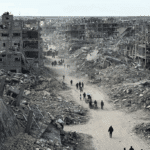Avocats Sans Frontieres (ASF) is pleased to report a decision that was recently issued in the province of South Kivu on February 21, 2011, sentencing Lieutenant-Colonel Daniel Kibibi Mutware, interim commandant in the 43rd operational sector of the Amani Leo operation of the Armed Forces of the Democratic Republic of the Congo (AFDRC), along with 10 of the officers serving under his command, to 10 to 20 years imprisonment, with mandatory minimum terms of imprisonment from 5 to 10 years.
The defendants were charged with crimes against humanity involving rape, false imprisonment, terrorism, and other inhumane acts in violation of the Statute of Rome, based on their actions from January 1-3, 2011 in Fizi, South Kivu.
Since 2003, ASF has helped victims of international crimes in Democratic Republic of the Congo (DRC) obtain justice and redress through national courts and tribunals.
This is only the second time in the history of the South Kivu province that a judicial decision has directly applied the provisions of the Statute of Rome. Ratified by the DRC in 2002, the Statute of Rome established the International Criminal Court.
This decision of the Military Court of South Kivu marks a significant development in international criminal law. It is also a step forward in the fight against impunity for international crimes—and more specifically for crimes involving violence against women—committed by the Congolese government and international actors in a region ravaged by conflict, and where sexual violence has become a military tactic.
At the close of the events that began in early January 2011, there were 89 victims that came forward to demand redress before the Military Court, alleging they were victims of mass rape. Moreover, 58 of those 89 also stated they had been subject to arbitrary confinement, the looting of their property, and other forms of inhumane and degrading treatment.
.JPG)
Recognizing, moreover, the responsibility of the Congolese government in authorizing the AFDRC troops as state agents, the Military Court found the DRC vicariously liable for the victims’ injuries. This last part of the decision could help the victims actually obtain an award of money damages to compensate them for their injuries, considering that most of the troops are quite poor, which would reduce the likelihood that any one of them could pay individually.
.JPG)
Distinguishing between the levels of responsibility for each defendant, announcing one acquittal and one dismissal for lack of personal jurisdiction, this decision truly seems to be a work of law.
The testimony of the witnesses was conducted in Swahili. ASF laments, however, that the defendants who did not speak French did not have the benefit of an interpreter during the legal arguments and when the decision was announced.
The victims, who were joined as civil parties to these cases by the intermediary ASF, expected three things from the framework of these trials: the punishment of the guilty; obtaining money damages and interest as compensation; and the relocation of the 43rd operational sector. This decision practically and theoretically achieved the first two of these.
Now it is for the Congolese government to ensure the proper enforcement of the decision announced, guaranteeing that those convicted are incarcerated in a state prison secure enough to prevent escape, providing an effective award of compensation for the victims, and finally preventing such acts by the military from being repeated.
ASF recalls that, to enable the effective prosecution of international crimes in the DRC, it has advocated for many years the adoption of a law to establish the Statute of Rome by Congolese parliamentary institutions. ASF also recalls the necessity of promoting fair trials while ensuring, among other things, quality legal representation for all parties involved in the process. ASF finally recalls that a judgment or decision that is not enforced remains a dead letter and is not effective in the fight against impunity.


.JPG)


